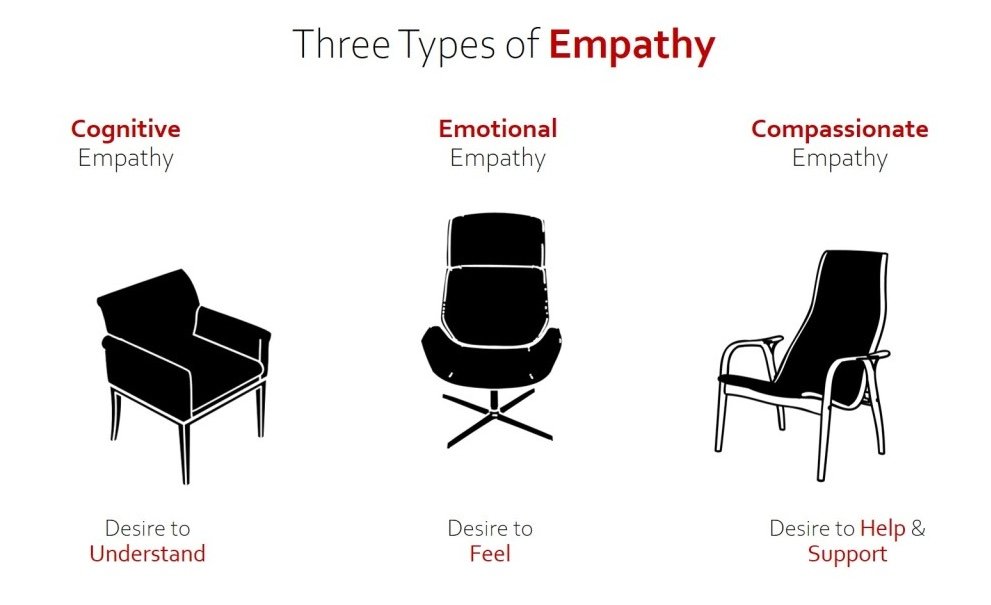Emotional intelligence (EQ) involves recognising, understanding, and managing one's own emotions, as well as influencing the emotions of others. Daniel Goleman's research indicates a strong correlation between high emotional intelligence and exceptional leadership performance. Unlike IQ, which remains relatively constant throughout life, EQ can be developed and enhanced at any stage. Harvard University emphasises the importance of emotional intelligence in leadership, offering programs designed to help leaders build trust, manage difficult discussions, and enhance team performance through improved emotional intelligence.
Over the next four days I will be writing about self-awareness, self-management, social awareness and relational management as these are the cornerstones of EQ.
Three forms of empathy
According to psychologists Daniel Goleman and Paul Ekman empathy manifests in three distinct forms: cognitive, emotional, and compassionate.
1. Cognitive empathy is our ability to understand other people’s points of view.
2. Emotional empathy is our ability to respond physically and emotionally to what someone else is experiencing.
3. Compassionate empathy is what creates the bond between team members within an organisation as well as between companies and countries.
I think you can place concentration as the root of empathy, and the importance of the latter in solving individual, personal and general social challenges.
Don't crave attention
There is a load of measurable, quantifiable coaching programs out there but I’m all about the human-to-human communication. I would like to draw your attention towards attention. There is a spectrum that goes from noticing the other person to tuning into the other person, I mean emphasising and understanding what’s going on with them. Are they in need? Is there something we can do to help them with compassion? These questions only arise in the first place when we go down that road as information consumes attention.
“A wealth of information creates a poverty of attention.”
In 2016, Daniel Goleman posted an interesting blog on Linkedin, in the blog Goleman quotes a landmark article by Robert Rosenthal and Linda Tickle-Degnan that described the three essential ingredients for rapport:
Mutual attention,
Shared positive feeling, and
Synchrony or coordination.
How can you improve your listening skills? While there are many strategies for developing better listening habits, a key step is to become aware that you aren’t listening well. Poor listening is often an unconscious habit and as such is governed by the part of brains that handles automatic tasks. Before we can change a habit, we need to become aware of it. That type of awareness can be developed through mindfulness, the secret ingredient in habit change. Once we’re aware in the moment, we can choose to step away from distractions and focus attention on another person. You can read Daniel Goleman’s blog here.
In the making
Human beings are unique in their ability to experience pleasure from remembering past happiness. You cannot always predict the major events that will shape your life, nor can you change the genetic factors that influence your basic happiness set point. You can't control what other people do or say, all you can control is how you react to it. Remember some skills improve communication, like emotional intelligence (EQ), as it enables people to better understand their own emotions as well as the emotions of those around them. Book recommendation: “Emotional Intelligence: Why it can matter more than IQ” by Daniel Goleman
The hedonic treadmill is a metaphor for the human tendency to pursue one pleasure after another. People talk about the hedonic treadmill that we have, where it’s like you are constantly striving for new and exciting things. That's because the surge of happiness that's felt after a positive event is likely to return to a steady personal baseline over time, you actually become less happy because it makes you more aware of all the things that you are missing out on. I think freedom is where you are not on the hedonic treadmill and pleasure which comes from selfless acts will tend to outlast physical pleasures.





